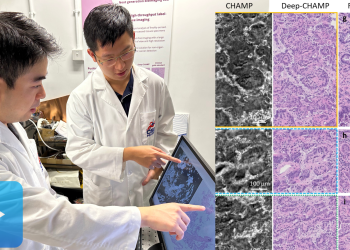News & Stories
2023
News
HKUST & GBAAA Jointly Organized Inaugural AI Symposium
It will take years or decades for the development of artificial intelligence (AI) to reach human-level AI. Robots will not take over the world. “Open source” is the only option.
These are among the thought-provoking insights that Turing Prize Winner Prof. Yann LeCun, hailed by the media as one of the “Godfathers of AI,” has shared with AI experts, scholars, industry leaders from around the world and students at a symposium held recently in Hong Kong.
Entitled AI NEW HORIZONS 2023: A Symposium with Scientific Leaders, the symposium was jointly hosted by the Hong Kong University of Science and Technology (HKUST) and the Greater Bay Area Association of Academicians (GBAAA).
In his keynote speech, Prof. LeCun envisioned objective-driven AI will help predict the future, and Joint Embedding Predictive Architecture (JEPA) model will make a paradigm shift in predictive modeling, that JEPA could bring about a “new Renaissance.”
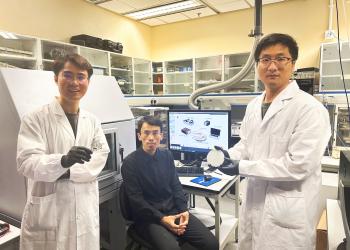
News
HKUST Researchers Develop Low-cost and Multifunctional Microprinter for Ultrafast Piezoelectric Material Printing
A research team led by The Hong Kong University of Science and Technology (HKUST) has developed a microprinter that can print piezoelectric films 100 times faster for the production of microelectromechanical systems (MEMS) for sensors, wearable or implantable medical devices, offering the possibility to lower the mass production costs.
The microprinter, built at a comparatively lower cost as compared with other printers on the market, utilizes an electrostatic field to propel streams of ink onto a platform, allowing for efficient manipulation of thin film patterns and enhanced printing speed to address the challenge of mass production and control of structures and feature sizes.
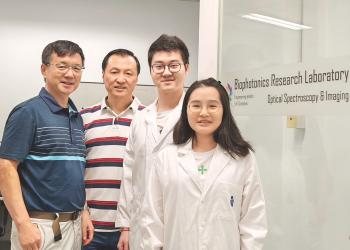
News
HKUST researchers Develop an Innovative Microscope Platform to Unveil the Intricacies of Skeletal Muscle Regeneration
Researchers at the Hong Kong University of Science and Technology (HKUST) have created a cutting-edge platform consisting of a dual-laser nonlinear optical microscope to investigate the dynamics of muscle satellite cells (MuSCs) during the process of muscle regeneration. This breakthrough has identified new mechanisms of MuSC behavior in muscle repair, paving the way for the development of targeted therapeutic strategies for muscle-related disorders.
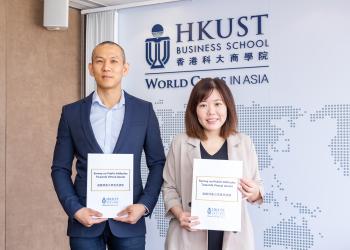
News
HKUST Releases Survey Findings on Public Attitudes Towards Virtual Assets
The School of Business and Management of The Hong Kong University of Science and Technology (HKUST Business School) found that 41 percent of Hong Kong people prefer not to hold virtual assets (VAs) Note 1, up by 12 percentage points from a previous survey, in the aftermath of an alleged financial fraud that involved a cryptocurrency platform in mid September.
This is one of the major findings of a two-phase survey released today by HKUST Business School. According to the survey findings, about 20 percent respondents say they would like to hold VAs in the future, down by five percentage points compared with one conducted months before the financial incident.
News
HKUST-led Research Unveils Early Predictors of Glioma Evolution by Self-constructed Machine-learning Model CELLO2
An international research team led by Hong Kong University of Science and Technology (HKUST) has unveiled how primary brain tumors evolve under therapy, and developed an artificial intelligence (AI)-powered model for patients to predict their prognosis, shedding light on better patient management strategies and precision oncology.
Malignant diffuse gliomas are the most common primary brain tumors in adults, which are primarily treated through a combination of surgery, radiotherapy, and the chemotherapy agent temozolomide (TMZ). However, TMZ treatment can usually only prolong patients’ overall survival time for around three months, as they almost inevitably suffer a relapse of aggressive gliomas. Until now, the molecular mechanisms driving the glioma evolution under the standard therapy remain elusive.

News
HKUST students make 3D-printed mooncakes to celebrate Mid-Autumn Festival (Chinese version only)
明天就是中秋節,除了賞月外,當然少不了要吃月餅。近日,香港科技大學(科大)一班綜合系統與設計學系的博士生,於助理教授李桂君的帶領下,炮製出全港首批利用3D打印技術印製的月餅。這批紫薯及奶黃口味的月餅,印有科大校徽。該食物打印機由團隊設計,除可印製月餅,亦可製作包括曲奇或蛋糕等甜品。
打印機現時只需十分鐘便能印製一個月餅,未來更可進一步縮短至五分鐘左右。過程無需借助模具創作複雜的圖案和形狀,食物材料及份量亦可根據用戶的要求和營養需要度身訂做。團隊將為打印機注入加熱功能,並已就此技術申請專利。目前市面的3D打印機只能印製肉類或朱古力等無需加工食物,未來新型打印機所製造的食物將無需另外加熱便可食用,實現「一條龍」3D打印兼烹調處理,大大減少製作時間。
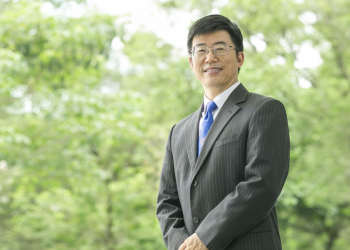
Stories
Digitalizing Disasters to Counter Climate Change
In the face of increasing extreme rainfall events that often trigger further dangers, School of Engineering civil engineers are setting out to develop a pioneering city-scale slope digital twin to boost forecasting, prevention, and mitigation of Hong Kong’s number one natural hazard: landslides.







